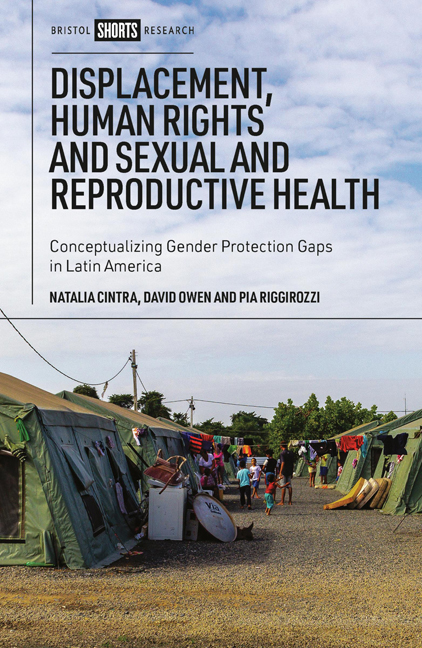 Displacement, Human Rights and Sexual and Reproductive Health
Displacement, Human Rights and Sexual and Reproductive Health Book contents
- Frontmatter
- Dedication
- Contents
- List of Figures and Tables
- Acknowledgements
- Introduction
- One The Gendered Character of Forced Migration
- Two Problematizing the Migrant– Refugee Distinction in Latin America
- Three Latin American Normative Frameworks of Migration and Asylum
- Four Protecting the Human Right to Health of Women and Girls from Venezuela as Necessary Fleers
- Five Responsibility and the Ethics of Forced Displacement in South America
- Conclusion
- Notes
- References
- Index
Five - Responsibility and the Ethics of Forced Displacement in South America
Published online by Cambridge University Press: 18 January 2024
- Frontmatter
- Dedication
- Contents
- List of Figures and Tables
- Acknowledgements
- Introduction
- One The Gendered Character of Forced Migration
- Two Problematizing the Migrant– Refugee Distinction in Latin America
- Three Latin American Normative Frameworks of Migration and Asylum
- Four Protecting the Human Right to Health of Women and Girls from Venezuela as Necessary Fleers
- Five Responsibility and the Ethics of Forced Displacement in South America
- Conclusion
- Notes
- References
- Index
Summary
Our empirically grounded socio-legal analysis of the predicaments of displaced Venezuelan women and girls in relation to protection and secure access to SRH rights highlights a range of obstacles to the enjoyment of these rights and more generally of recognition of their dignity. In this chapter, we address the requirements of protection and of the enjoyment of SRH rights, and provide an analysis of the distribution of responsibility for securing such conditions. We begin by returning to the challenges confronted by female necessary fleers in transit, in places of immediate refuge and in settlement, before turning to situate these in the ‘necessary fleer’ framework and the core principles of protection that it establishes. This is followed by abstract and general reflections on responsibility, contextualized in relation to the Venezuelan displacement. We distinguish the different roles and responsibilities of a range of actors that encompass governmental and non-governmental agents as well as the displaced women and girls themselves. Finally, we locate this account of protection and responsibility within a wider justice and development framework that addresses the conditions that generate necessary flight.
Protection gaps and obstacles to enjoying rights
Given their compelling reasons for flight, Venezuelan women and girls face the initial challenge of passage to the border of a neighbouring state as a place of immediate refuge. Passage is important in two different but related respects. The first is that different forms of passage may involve very different levels of risk, and especially of gendered risks of sexual assault and violence. The second is that the form of entry can significantly affect the legal status assigned to those who flee with effects on their ability to access SRH rights. The relationship between the two is that a destination state's border policies may effectively require some fleers to take irregular routes to border crossing when borders are closed to all (for example, during the pandemic) or to those who have reasonable grounds of flight (for example, because their claims do not fit well with the 1951 Convention or they lack required forms of documentation such as passports). This is one determinant in shaping their (il)legal status once they have crossed the border.
- Type
- Chapter
- Information
- Displacement, Human Rights and Sexual and Reproductive HealthConceptualizing Gender Protection Gaps in Latin America, pp. 117 - 150Publisher: Bristol University PressPrint publication year: 2023
